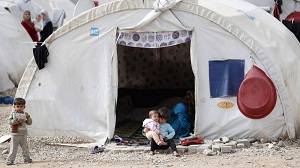European leaders say a new deal with Turkey to stop refugees and migrants from making dangerous journeys is working.
German Chancellor Angela Merkel and EU officials visited a refugee camp in southeastern Turkey on Saturday in an attempt to bolster the controversial deal.
Merkel, accompanied by Donald Tusk, EU president, and Frans Timmermans, European Commission vice president, visited a camp in Nizip - near the Syrian border - to inaugurate an EU-funded project in support of Syrian children and hold talks with Ahmet Davutoglu, Turkish prime minister.
Tusk praised Davutoglu and his government, saying his visit to the camp had shown him that Turkey "is an example for the whole world on how we should treat refugees".
Tusk said the EU will spend €1bn ($1.1bn) this summer on projects to improve the lives of Syrian refugees.
The media were not allowed into the Nizip camp to talk to refugees. But speaking to Al Jazeera through the fence, Syrians asked if they wanted to stay there or go to Europe responded with one word: Leave.
In a deal agreed to last month, the 28-member EU is offering Turkey a package of incentives - from billions in refugee aid to progress on visa-free access to the bloc for Turkish citizens - in exchange for help in returning refugees.
Turkey, with 2.7 million registered Syrian refugees, is host to the largest number of refugees in the world.
About 280,000 of them live in camps.
Praised by Merkel and EU leaders but called inhumane by critics, the deal is aimed at discouraging people smuggling via treacherous sea routes by cutting off the main migration trail from the Middle East to Europe.
"Our goal is not only to stop illegal migration, but for refugees to have more opportunities near their home," Merkel said at Gaziantep University.
She said she had been "very impressed" with Turkish efforts at the Nizip camp.
She said that EU-funded projects that form part of the migration deal are intended to provide opportunities for all Syrians living in Turkey - not just those living in camps - and to pave the way for "all children to have an education".
In Gaziantep, surveys of refugees by the Syria Relief Network, a coalition of NGOs, suggest only a third of the children go to school.
Refugee work permits
For his part, Davutoglu said Turkey had met all its responsibilities in the deal, such as issuing refugee work permits, and rejected claims that Syrians were being sent back to their homeland against their will.
"We have fulfilled our side [of the deal]," he said, adding that visa-free access to the EU for its citizens is "essential".
Davutoglu said the deal had already had a significant impact and that the number of people illegally crossing the Aegean Sea each day had dropped from 6,000 in November to 130.
Turkish leaders have previously warned that the agreement will collapse if the EU fails to grant visa-free access.
The EU has faced severe criticism over the deal, including from the UN refugee agency UNHCR, parliamentarians at the Council of Europe, opposition politicians in Germany and rights watchdogs.
"Instead of touring a sanitized refugee camp, EU leaders should look over the top of Turkey's new border wall to see the tens of thousands of Syrian refugees blocked on the other side," said Judith Sunderland of Human Rights Watch's Europe division.
"Then they should go to the detention center where people deported from Greece are held incommunicado."
PHOTO CAPTION
Syrian refugees in Turkey [Reuters]
Al-Jazeera


 Home
Home Discover Islam
Discover Islam Quran Recitations
Quran Recitations Lectures
Lectures
 Fatwa
Fatwa Articles
Articles Fiqh
Fiqh E-Books
E-Books Boys & Girls
Boys & Girls  Ramadan
Ramadan Fatwa Audios
Fatwa Audios Month of Mercy
Month of Mercy Women
Women Eed Al- Fitr
Eed Al- Fitr Food Recipes
Food Recipes Videos
Videos

 Prayer Times
Prayer Times












